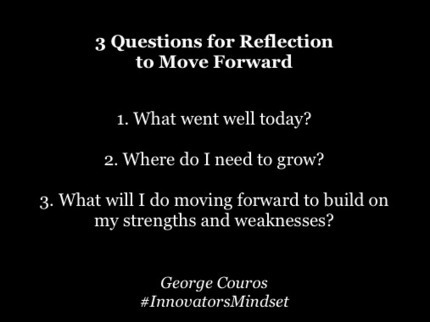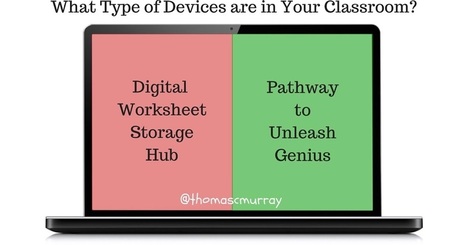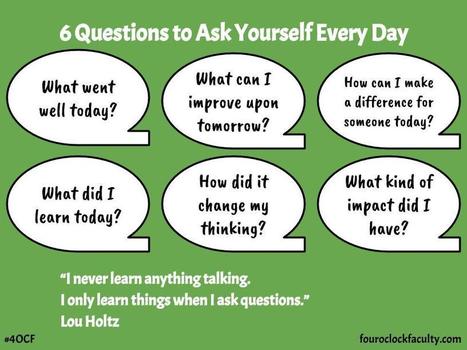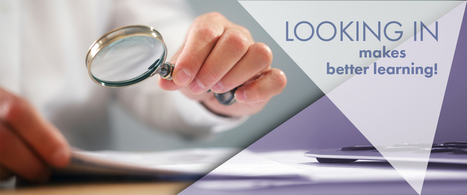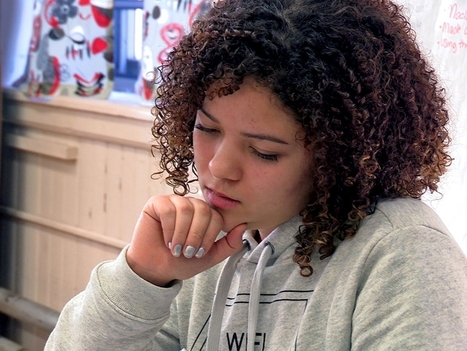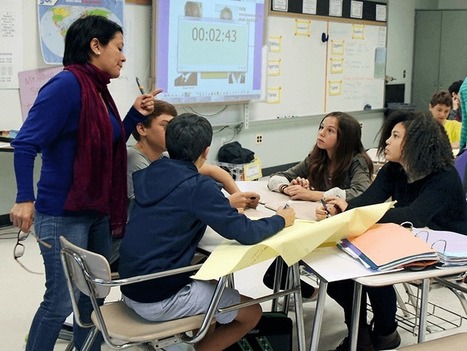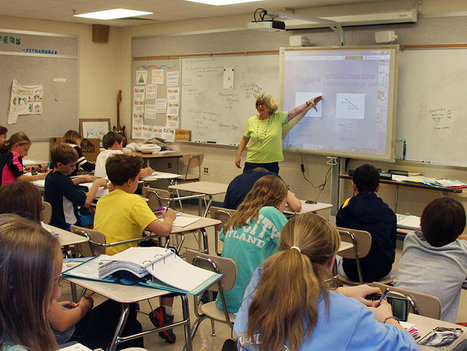 Your new post is loading...
 Your new post is loading...
One of the Enabling Competencies identified by the Special Libraries Association is lifelong learning. In busy jobs, taking time to stop and learn something new is not always the easiest thing to do. As I’ve worked to balance professional development with immediate needs, I started to incorporate the practice of being a reflective practitioner.
“Student Voice” is something that many schools are focusing on and for a good reason. If we, as educators, understand that we serve our students and not the other way around, getting their thought and feedback for not only problems but solutions in moving our schools forward, is crucial. From my experience though, I have seen a lot of money, time, and effort, in getting thoughts and feedback from students, listening to their voice, and then often, no action based on what they have shared. Dean Shareski wrote a challenging post on this and shared the following thoughts on “Student Voice”:
When it comes to improving outcomes in the digital age, efficacy matters more than ever. Billions of dollars are spent across the world on technology with the hopes that it will lead to better results. Tom Murray and I shared this thought in Learning Transformed:
Educational technology is not a silver bullet. Yet year after year, districts purchase large quantities of devices, deploy them on a large scale, and are left hoping the technology will have an impact. Quite often, they’re left wondering why there was no change in student engagement or achievement after large financial investments in devices. Today’s devices are powerful tools. At the cost of only a few hundred dollars, it’s almost possible to get more technological capacity than was required to put people on the moon.
This is the first year I had to seriously consider why I ask my students to buy composition notebooks for journal writing. As every ninth grader now has their own Chromebook, teachers have been encouraged to consider how they can utilize technology to update their practices. Although I tried, I couldn’t quite embrace the idea of abandoning the hardbound composition notebook.
As longtime practitioners in our disciplines, we develop implicit skills that can be the source of some of the deepest learning for our students. In his book Experience and Education, John Dewey describes habit as “the formation of attitudes, attitudes that are emotional and intellectual…our basic sensitivities and ways of responding to all the conditions we meet in living” (35). Experiencing implies the sensing body, embodied learning, and Dewey does not shy away from the emotional dimensions of learning—both of which are often where the deepest learning happens, where students’ passion for a discipline ignites, and where experts’ best ideas originate. These often-overlooked dimensions of learning are also where empathy lives, and so it is there that knowledge might blossom not only into expertise but into wisdom.
I recently attended the CILIP New Professionals’ Day. It was my second time presenting at the event and this year I got to stay for the whole day, to enjoy the other presentations and chat to people.
At lunchtime I got chatting with Ross, who had been to my talk the previous year, about professional confidence and professional development. Our conversation turned to Chartership and reflective writing. Ross described how – as a naturally reflective person – the process of reflective writing for Chartership can seem a bit mechanical and arduous. He also described how many of us can feel uncomfortable with talking and writing about ourselves, it can feel a bit self-indulgent or navel-gazing. I understand all of these sentiments is because I have had exactly the same thoughts and have heard them from others. We discussed how I had found reflective practice practically useful in improving my practice.
6 Questions to ask yourself every day.
One of the strategies that I use when creating lesson plans is to reflect on the previous lesson. Part of that reflection includes feedback from students. This can be done by simply asking students to raise their hands in response to a "did you get it?" type of question, but I like to have better record of responses than just a hand count. Here are some tools that can be used for collecting exit information from students.
With online teaching, the only person to blame is yourself. That is what being objective means in this industry. An objective and reflective practitioner blames only himself or herself. If there is a problem, you need to consider ways to avoid it in the future by changing what you do and say, as well as how you act.
Via Nik Peachey
Reflective practice has still not received the prestigious position it deserves in an eLearning environment. Writing is the primary mode of communication in an eLearning environment. Writing about recently learned material, latest changes in personal attitude, acquisition of new behaviors and how to use new knowledge in the work context are all an integral part of reflective writing.
"...a request from someone important to me on the other side of the world provokes my thinking…
‘ Have you ever written a blog post on strategies, tools or frameworks that a teacher can use to reflect on their past year of teaching?’
My immediate response: ‘ Reflection has to happen all the way along. It’s too late at the end of the year.’
But here are some questions to ask yourself, as you look back, look within and look forward…"
Via Jim Lerman, Dean J. Fusto
Through being reflective about your own teaching practices, model and guide students toward a more reflective approach to their projects, grades, actions, and reactions.
Via Amy Burns, Ivon Prefontaine, PhD, Dean J. Fusto
Pernille Ripp, 7th grade teacher in WI, shares her transformation and pathways to personalized learning environments and passionate learners.
|
We know that reflection increases student learning. It supports growth mindset and encourages students to improve and learn from their mistakes. We may engage our students in reflection in our classrooms, but it’s not often habitual—I know I’ve been guilty of treating reflection as an event rather than as something we do all the time.
When a discussion didn’t go anywhere.
When a group couldn’t seem to work together.
When the answer was wrong.
When the grade was unexpected.
When not all that many students are paying attention.
When things don’t go as planned or turn out as expected, the first response tends to be emotional—anger, embarrassment, frustration, disappointment. After riding the emotional wave, it’s easy to just let the tide go out. But when things go awry, those are times when critical reflection can offer insights that lead to learning.
15 Reflection Strategies To Help Students Retain What You Just Taught Them by Terry Heick Reflection is a natural part of learning. We all think about new experiences–the camping on the car ride home, the mistakes made in a game, or the emotions felt while finishing a long-term project that’s taken months to complete. Below …
Via Ana Cristina Pratas
I'm often asked why I blog. What's the attraction? Is it worth the effort? How do I keep it going? Here are 5 reasons:
How can you be better tomorrow than you were today as a teacher? Try working with these 10 self-reflective questions to make change happen.
This is the fourth and final article of a series discussing analytics for the classroom teacher. Here, we focus on Teaching and Learning Analytics.
This article discusses the concept of Teacher Inquiry as an effective method for guiding teachers’ reflection and improvement of their practice and outlines the emerging Teaching and Learning Analytics technologies, as a means to support teachers to holistically engage in this process.
Consider John Dewey’s famous quote “We don’t learn from experience. We learn from reflecting on experience.” This makes a lot of sense. We as educators can only really progress in our craft by thinking about and making conclusions regarding our day-to-day experiences in the classroom.
Via Nik Peachey
One of the the most universal patterns of learning in any context is to encounter a new idea, and then put that idea into action somehow, whether through near transfer or far. A daily pattern of reading, then doing something as the result of what’s been read can provide an easy framework for authentic learning outside of the classroom.
To create equity in their schools, educators must seek to validate and acknowledge students, expose and reveal the unseen, encourage questioning, and facilitate reflection.
Rebecca AlberStudent EngagementWhen students reflect on what they have learned, ownership of that new knowledge increases. Check out these three strategies to use with secondary students.
Via Dean J. Fusto
“Within the world we find two dimensions, reflection and action, in such radical interaction that if one is sacrificed—even in part—the other immediately suffers.” –Paolo Freire, Pedagogy of the Oppressed Skilled learners are aware not only of what they’re learning but how they’re learning (or not learning) it. They stop a moment during their studies... Read More
At my university, I teach students in an interpersonal communications course. These students are first term college students, a few fresh out of high school. As is my common practice, I end my week of instruction with reflective questions for the students: What was your significant learning this past week? What principles for everyday life can you extract from our class activities? (Note: The activities are experiential). What did you learn or what was reinforced about yourself? What can you take from the class activities to use in your life outside of class?
|
 Your new post is loading...
Your new post is loading...
 Your new post is loading...
Your new post is loading...










